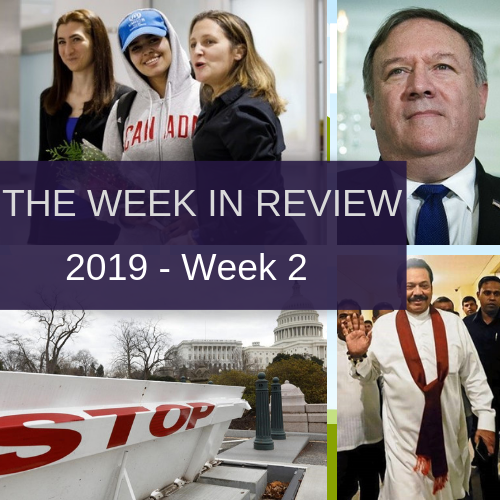
Escaping her physically and psychologically abusive family, 18-year-old Rahaf Mohammed Motlaq al-Qunun from Saudi Arabia fled from Kuwait, hoping to seek asylum in Australia. While the family was on vacation in Kuwait, Rahaf left her family and got on a plane to Thailand which she hoped would take her to Australia, after renouncing Islam. However, she was stopped and taken into custody in Bangkok, Thailand for a lack of documents.
She was detained in a hotel room and was supposed to be put on the next flight and sent back to Kuwait but she barricaded herself in the hotel room and made a live video plea for refugee status on twitter which got her international support. If sent back, she said she was sure she would be killed as Saudi Arabia had numerous Human Rights violations and honour killings were not uncommon.
With her life under threat, the United Nationals High Commission for Refugees (UNHCR), granted her refugee status and on the principle of non-refoulement, she cannot be returned to Saudi Arabia.
UNHCR then reached out to Australia and while her status was under determination, Canada stepped forward and granted her refuge, fuelling the already existing tensions between Saudi Arabia and Canada over the latter's condemnation of Saudi Arabia's human rights violations.
The second US government shut down that began on the 22nd of December is in its fourth week, becoming the longest government shutdown in US history. The shutdown occurred because the Democrats in the House of Representatives rejected the funding of President Donald Trump's campaign promise of funding a US-Mexico border wall. Trump retaliated by saying that he would veto any bill that does not provide for the wall. According a poll conducted by the Washington Post and ABC News, by a wide margin, more Americans blame President Trump and Republicans than the congressional Democrats for the record-breaking government shutdown and moreover, reject the President's assertion that an illegal-immigration crisis occurs at the Southern border.
About 800,000 federal workers are facing increasing issues and problems without pay and are potentially jobless. This has also led to an understaffed and empty White House. President Trump has denied declaring a national emergency and is ready to strike a negotiation with the Democrats regarding the $5.7 billion border wall demands.
Trump who had promised a wall to the citizens during his election campaign, which would be paid for by Mexico's government, is now claiming that money will come from the new trade deal and from funds from the military, water management and disaster management agencies of the government. Construction of the wall is underway in states like New Mexico and Texas and is schedules to be completed by May 2019. The wall is being constructed with barriers and steel fencing that will be regularly monitored.
President Trump's decision to pull out the US troops from Iraq last month sent another message to West Asia about his shifting focus from West Asia. Many journalists as well as political leaders have criticised Trump on not meeting any Iraqi official on his visit to Iraq and only addressed his own troops. This pressure from the media resulted in an impromptu visit of Mike Pompeo, the Secretary of State to visit Iraq.
The US Secretary of State being in Iraq at such a short notice is a measure to put the growing uneasiness of the West Asian leaders about USA slowly backtracking itself from the region to a complete rest. The newly elected Iraqi Prime Minister, Adil Abdul al-Mahdi has said that the defeat of ISIS militarily does not mean that the war against ISIS is over. The Iraqi leaders want to ensure that the last tenets of the caliphate are uprooted from the region.
Pompeo, in an interview to bring a vote of confidence to the withdrawal of troops, said that the withdrawal of troops will not be hasty and the US Government is holding talks with other countries in order to completely remove the remote remains of the caliphate. Countries like Turkey and Saudi Arabia were major critiques of the withdrawal of the US as it posed a threat to the security of the Kurdish soldiers in the region. Thus, this visit was a way to ensure that the good relations between USA and the West Asian countries are not put under a lot of pressure.
The political turmoil in Sri Lanka has taken an unprecedented turn. Sri Lankan President Sirisena in late October abruptly sacked Prime Minister Ranil Wickremesinghe and replaced him with Mahinda Rajapaksa. Rajapaksa who was sworn in as the PM in October has resigned on 15 December 2018. Rajapaksa's son Namal Rajapaksa announced his father's decision to step down on Twitter. On 3 December 2018, the court suspended Rajapaksa's power as Prime Minister and adjudged that his cabinet could not function until its legitimacy was established.
After his resignation, Rajapaksa was appointed as Sri Lanka's main opposition leader in Parliament, since his political grouping had the largest number of MPs. Rajapaksa takes over from R Sampanthan of the Tamil National Alliance who held the post since 2015. The announcement was made by Speaker Karu Jayasuriya in the Parliament, which met for the first time since the reinstatement of Ranil Wickremesinghe, only two months after President Sirisena ousted him two months ago.
Members from Tamil National Alliance (TNA) and the Sri Lanka Muslim Congress (SLMC) raised objections against Rajapaksa's appointment because they claimed that Rajapaksa is no longer a Member of Parliament as he had recently joined another political party. Rajapaksa obtained membership of the Sri Lanka People's Party (SLPP) and left the United People's Freedom Alliance (UPFA) from where he was elected to Parliament in 2015.
The Speaker Jayasuriya has asked the other parties in Parliament to make a written submission against Rajapaksa so that a committee could dive deeper into the details.